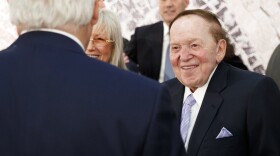Updated at 5:40 p.m. ET
Two liberal watchdog groups are challenging the strategy that four presidential hopefuls — Republicans Jeb Bush, Scott Walker and Rick Santorum and Democrat Martin O'Malley — are using to avoid legal contribution limits and disclosure requirements.
In complaints filed at the Federal Election Commission, the and say that while the four politicians all maintain that they're not even considering running for president, they all have crossed the legal line that defines a candidacy or a "testing the waters" phase in campaign finance law.
The complaints cite examples in federal regulations of conduct that turns a politician into a candidate. Three examples seem to describe what's gone on this winter and spring, when un-candidates have:
The complaints also cite regulations on the activities that define a "testing the waters" committee — the status the un-candidates are avoiding. Two stand out:
Lis Smith, spokeswoman for O'Malley's superPAC, O'PAC, said there was no merit to the complaint against the Democrat. She said, "We are confident that — whatever the case may be with the other potential candidates — that is what the FEC will find."
Walker is using the "issues-based" superPAC to talk about "his reform-minded principles in Wisconsin," said Kirsten Kukowski, spokeswoman for Walker's superPAC, Our American Revival. She didn't directly address the complaint but added, "If there are any announcements about his future he will do it in accordance with the law."
Spokesmen for the other un-candidates did not respond before deadline.
Paul Ryan, senior counsel to the Campaign Legal Center, said his group may also file complaints concerning other undeclared presidential hopefuls. So far, only Republican Sen. Ted Cruz, of Texas, has his candidacy.
Ryan said the strategy of not declaring fails to exempt politicians from "election laws passed by Congress to keep the White House off the auction block."
Copyright 2021 NPR. To see more, visit https://www.npr.org. 9(MDAxNzg0MDExMDEyMTYyMjc1MDE3NGVmMw004))






